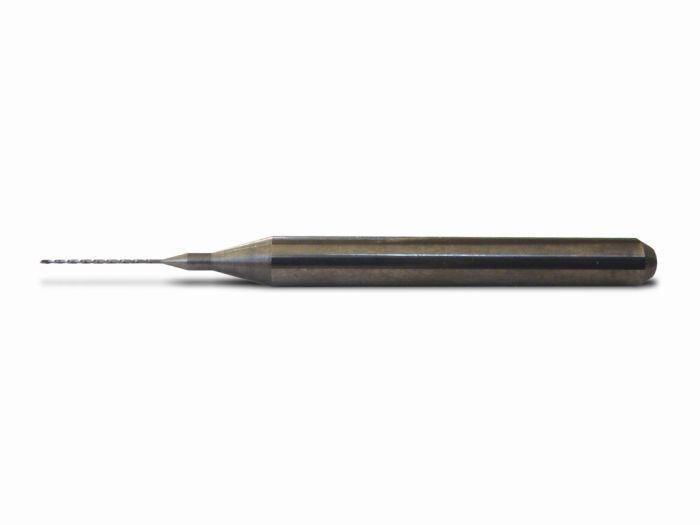0.2 mm Micro drills for high density multi-layer boards
Micro carbide drills are commonly used in the PCB (Printed Circuit Board) manufacturing industry, particularly for drilling high-density multi-layer boards (HDI). These boards require precise and reliable drilling due to their complex design, smaller trace widths, and increased layers. Here’s an overview of why micro carbide drills are suitable for this application:
Why Use Micro Carbide Drills for HDI Boards?
-
High Hardness and Durability:
- Carbide is a material with high hardness and strength, making it ideal for drilling through the harder and denser layers of multi-layer boards. It can withstand the intense forces encountered during high-speed drilling without wearing down quickly.
- The micro size (small diameter) of these drills ensures they can handle the tiny holes needed in HDI boards without breaking or dulling.
-
Precision:
- HDI boards typically have smaller and more intricate designs, with micro vias (small holes for electrical connections) that require high precision. Micro carbide drills provide consistent hole quality with tight tolerances.
- Their sharpness and high cutting efficiency allow for accurate hole sizes, which is critical in multi-layer boards where a slight misalignment could disrupt the entire design.
-
Thermal Resistance:
- Carbide tools are resistant to heat, which is essential when drilling through multiple layers of material. The high speed and heat generated during drilling can lead to tool wear, but carbide’s resistance helps prevent tool damage and ensures longer tool life.
-
Fine Cutting Edge:
- The fine cutting edge of micro carbide drills enables clean cuts and minimizes the risk of damaging delicate layers of the PCB. This feature is essential when working with HDI boards that often incorporate sensitive materials like copper and glass fiber.
-
Efficiency in High-Speed Drilling:
- Carbide drills are efficient at high rotational speeds, which is important in the fast-paced production of HDI boards. They can handle high-speed drilling operations without compromising on hole quality or precision.
Specifications and Features:
-
Diameter Range:
- Micro carbide drills for HDI boards typically have diameters ranging from 0.1 mm to 1.0 mm, though smaller sizes are available for ultra-fine via drilling.
-
Point Angle:
- A typical point angle for micro carbide drills is 90° to 120°. However, the choice of point angle may depend on the application and the materials being drilled.
-
Coatings:
- Some micro carbide drills for HDI boards are coated with materials like TiN (Titanium Nitride) or TiAlN (Titanium Aluminum Nitride) to further enhance their performance and durability, improving their resistance to wear, heat, and corrosion.
-
Cutting Speed:
- The cutting speed varies depending on the material and board type. Carbide drills can handle high cutting speeds while maintaining their sharpness and providing a cleaner finish.
-
Tool Life:
- Carbide drills offer superior tool life compared to other materials like HSS (High-Speed Steel), especially under demanding conditions such as drilling multiple layers and small holes.
Applications in HDI Boards:
-
Micro Vias: HDI boards often require the drilling of very fine holes (micro vias) that connect different layers of the board. Micro carbide drills are ideal for creating these vias due to their sharp cutting edges and precision.
-
Through-Hole and Blind Vias: Carbide drills can also handle through-hole vias or blind vias (where the hole does not go all the way through the board), both of which are common in HDI board designs.
Maintenance and Handling:
-
Tool Wear: Regular monitoring of tool wear is important. Due to the fine nature of the drill bit, it can be prone to breaking if excessive pressure or improper speeds are used.
-
Coolant Usage: Proper coolant or lubrication can help improve the lifespan of micro carbide drills and reduce the risk of overheating.
Conclusion:
Micro carbide drills are essential tools for manufacturing high-density multi-layer PCBs. Their precision, hardness, thermal resistance, and efficiency make them the best choice for drilling the tiny, intricate holes required in HDI boards. When selecting micro carbide drills for your PCB production, it's important to consider factors like diameter, coating, point angle, and cutting speed to match the specific needs of your project.
| drill bit diameter | 0.2 |
|---|---|
| Lt | 38 |
| Lc | 3 |
| Ds | 3.175 |
| shank type | HA |
| Material | YG8 |
| Manufacturer | UT |
| Country of Manufacture | China |

